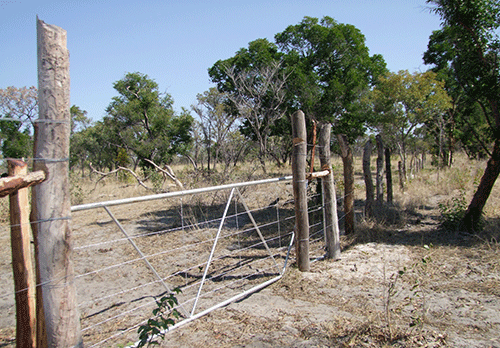The Ministry of Agriculture, Water, and Land Reform has managed to remove illegal fences covering a combined 72.3 kilometres in Kavango West and Ohangwena regions.
Over the years, the ministry has raised concern over illegal fencing of communal land, especially in the northern regions.
The ministry said illegal fencing of communal land is a challenge in most regions, as large areas of grazing land are being fenced off.
Such concerns prompted the ministry to hire the National Youth Service (NYS) in November 2022 to remove illegal fences.
In an interview with New Era this week, the ministry’s spokesperson Jona Musheko said the team managed to remove a combined nine illegal fences in Kavango West and Ohangwena regions.
A total of eight fences were removed in Kavango West and one fence was detached in the Ohangwena region.
“All the nine fences of 72.3km were successfully removed. NYS with their 50 youth hired for this assignment commenced on 18 November 2022 and the operation was successfully completed on 4 December 2022. The Namibian Police in both Kavango West and Ohangwena regions were involved and provided security to the youth during the exercise,” Musheko noted.
Asked what happened to the removed structures, Musheko said the materials were transported and stored in Rundu and Eenhana.
During the 2023/24 financial year, he indicated the Kavango West and Ohangwena communal land boards are expected to sell the materials removed from the nine illegal fences to cover costs of removing the fences by the National Youth Service.
“All the areas which were illegally fenced are now available to lawful residents from the affected communities for the grazing of their livestock and use of their natural resources such as fruits and grass for their houses,” Musheko said.
The regions which have high numbers of illegal fences in Namibia are Omusati, Ohangwena, Kavango East, Kavango West, Otjozondjupa and Omaheke.
According to him, there have been numerous complaints from the general public on illegal fencing of communal areas and illegal sale of customary land being perpetrated by mostly traditional leaders.
“Communal land boards and traditional authorities always receive reports of illegal fences from affected communities. These reports are always investigated by land boards to determine which fence is indeed illegal and which is not,” he maintained.
Once a fence is found to be illegal, land boards normally issue notices to fence owners to remove their fences voluntarily and only after the owner refuses to remove the fence do these boards request the ministry to remove such a fence.
Musheko assured the public the ministry has funds set aside to assist all communal land boards and traditional authorities to remove illegal fences, thus, the NYS shall always be hired for the removal of illegal fences.
Since the enactment of the Communal Land Reform Act No 5 of 2002 in March 2003, the ministry has been educating communal land boards, traditional authorities, and communities on the provision of the Act, including the prohibition of fences in communal areas.
The second national land conference in 2018 also directed the ministry to take strong action against those erecting illegal fences in communal areas.
Therefore, the ministry will include some activities in its annual plans to ensure that the erection of illegal fences comes to an end.
These include financial and technical support to all communal land boards.
The ministry will also create awareness campaigns in the form of community meetings and workshops regarding illegal fences and other provisions of the Communal Land Reform Act.
Illegal fencing audit is another activity that the ministry may consider in the future.
This, Musheko believes, will assist the ministry, communal land boards and traditional authorities identify legal and illegal fences for appropriate action in line with the provisions of the Communal Land Reform Act.
The ministry advised community members to stop erecting illegal fences in the commonages in communal areas.
“Those who have erected illegal fences are advised and encouraged to remove them before legal actions are taken by the ministry and communal land boards. This applies to those who keep selling and buying communal land as this is prohibited by the Communal Land Reform Act,” he cautioned.
–anakale@nepc.com.na



